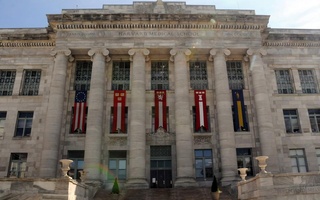A team that includes four Harvard professors has been awarded $300 million to establish an international consortium of laboratories that will work to develop an HIV vaccine.
The consortium, which is called Center for HIV/AIDS Vaccine Immunology (CHAVI), will have labs at Duke, Harvard, Oxford, and the University of Alabama. Barton Haynes, a professor of immunology at Duke University, will head CHAVI, though three Harvard professors will head three of its five core areas of research.
The grant, awarded on July 14 by the National Institutes of Health, will pay out $15 million this year and up to $45 million annually for the remainder of the seven-year grant. The grant is the first venture of the Global HIV Vaccine Enterprise, which was endorsed by the G-8 countries at a summit in June 2004.
Professor of Medicine Norman L. Letvin ’71, one of four senior scientific directors of CHAVI, will direct the Center’s vaccine production core.
“I like to think that what we’re doing is very important for America and for the world,” Letvin said. “The commitment from the government can always be greater.”
Joseph Sodroski, a professor of immunology and infectious diseases at Harvard’s School of Public Health, said that he does not consider the consortium’s decentralized structure, with four labs spanning two countries, to be an impediment to the Center’s efforts.
“I think the key is that it sets up a network that will continue to have interactions among its members,” Sodroski, one of CHAVI’s senior scientific director, said. “We don’t need to be in the same building. There’s lots of ways of communicating these days.”
The other two Harvard professors on the initiative are Raphael Dolin, Harvard Medical School’s dean for academic and clinical programs, and Stephen Harrison, a professor of biological chemistry and molecular pharmacology and of pediatrics at Harvard Medical School.
Both Dolin and Harrison will head research teams. Dolin’s team will lead the Center’s clinical core, while Harrison’s team will lead its structural biology core.
Above all, the researchers are trying to stop the spread of AIDS, which has been an epidemic for many years now. In December 2002, the Joint United Nations Program on HIV/AIDS estimated that 42 million people were living with HIV/AIDS globally, 3.2 million of whom were children under fifteen. Thirteen thousand people contract the virus daily.
The researchers’ work will be evaluated by an outside advisory board, composed of research scientists and specialists outside academia.
Haynes said that efforts to find a vaccine have been difficult because HIV/AIDS researchers do not yet have the tools to battle the difficulties—like rapid mutation—posed by the HIV retrovirus.
The researchers, many of whom have worked together for years, will focus their efforts on the effects of the virus immediately after it enters the body. Such research is normally difficult, because people usually do not know exactly when they contract the virus.
CHAVI doctors under Letvin’s command will inject mice and “non-human primates”—monkeys—with synthetic forms of the virus in order to analyze the immune system’s response in the hours just after the infection, when the body is still producing antibodies.
“What we’re hoping to do is first to study, in the monkeys, the nature of the immune response in the very early minutes to hours to try to get a handle on what might make up a successful immune response and what might make up an unsuccessful response,” Letvin said.
The current CHAVI members beat out a team led by Director of the Division of AIDS at Harvard Medical School Bruce Walker, according to the Boston Globe. Walker is currently on vacation and could not be reached for comment this week.
—Staff writer Natalie I. Sherman can be reached at nsherman@fas.harvard.edu.
Read more in News
Bankers Lunch, Laud DiversityRecommended Articles
-
Flu Season, Flu Shots Arrive on CampusFor the second year in a row, Harvard University Health Services (UHS) is going into dining halls and other campus
-
Health Service Gives Free Salk InjectionsThe University Health Service announced yesterday that it is now administering free Salk shots to any student under 30, since
-
Prof Finds Herpes VaccineA new herpes vaccine developed by a Harvard Medical School (HMS) professor may soon be approved for human testing, according
-
Society Debated HPV VaccineCORRECTIONS APPENDED After a heated debate last night, the Harvard Speech and Parliamentary Debate Society came out against making the
-
 Professor Argues for Development of HIV/AIDS Cure
Professor Argues for Development of HIV/AIDS Cure













